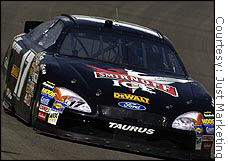
NEW YORK (CNN/Money) -
Tougher times for auto racing teams chasing sponsorship dollars are driving Nascar to hard liquor.
And that could lead to a major headache for the sport's traditional beer sponsors.
This week, the racing circuit announced it will allow teams to accept sponsorship deals from hard liquor advertisers. Spirits company Diageo (Research), which had approached Nascar more than a year ago about a sponsorship, will sponsor a car for its Crown Royal whisky next season.
What's more, Diageo may not be alone when the green flag drops at Daytona in February. Jack Daniels and Jim Beam are already in discussions as well, according to Zak Brown, a motor sports agent who helped negotiate the Diageo deal.
You might think that concern about sending mixed messages about drinking and driving that kept Nascar from accepting hard liquor deals before now. You'd be wrong.
Instead, the greatest worry appears to have been about how the idea would sit with Nascar's current beer sponsors.
In fact, one of the most prickly statements about the change in policy didn't come from Mothers Against Drunk Driving or any anti-drinking public interest group, but from Anheuser-Busch.
 |
|
| Diageo had already been a Nascar sponsor with its Smiroff Ice brand. |
"We believe the public views beer and hard liquor very differently. This is reflected in the way government and policy leaders have treated the two products since Prohibition," said a statement from John Kaestner, vice president of consumer affairs for the world's largest brewer, and the nation's largest sports advertiser.
"In 2002, hard liquor attempted to begin advertising on network television. Due to public and governmental concerns, NBC rescinded its decision to accept such ads," the statement continued. "We expect that Nascar will be closely monitoring the public acceptance of this new sponsorship."
Even with a clear advertising advantage, beer has seen its share of the U.S. alcohol market slipping, with liquor posting more than twice the consumption growth rate as beer over the last decade, according to Adams Beverage Group, a market research firm.
| SportsBiz
|

|
| Click here for SI.com sports coverage |
|
|
The brewers are obviously concerned about anything that could open the door to more competition.
Since beermakers already provide about 10 to 15 percent of Nascar's sponsorship dollars, inviting their competitors had to be done carefully. Nascar spokesman Jim Hunter said that Nascar officials had several meeting with beer companies in advance of the change, although he wouldn't give details of those talks.
The race circuit also consulted with its TV partners -- Fox, NBC and Turner Broadcasting -- which pay $400 million a year in rights fees to Nascar. Hunter said that the networks were understanding of the change.
"Everyone knows, sponsorships drive this sport," said Hunter. "There's a difference between a car going around with a name on it and a 30-second commercial."
| Related columns
|

|
|
|
|
Still, one of the public interest groups that want to end alcohol advertising in U.S. sports contends that even without liquor commercials airing on the race broadcasts, this decision is a blow for their efforts.
"It's an end run around the voluntary bans that the networks respect," said George Hacker, director of the Alcohol Policies Project at the Center for Science in the Public Interest. "This will be the equivalent of a branded liquor bottle racing around the track."
Hacker claims that liquor companies created malt beverages like Smirnoff Ice in part as way of advertising their brands on network television. Smirnoff Ice also has been a Nascar sponsor since 2003.
"These sponsorships will be just another way to blur that line against liquor ads," he said. "Our concern about liquor advertising is not based on any belief that liquor is any worse than beer. It's that this is creating a situation where you could dramatically increase alcohol advertising that is highly accessible to young people."
Hunter conceded it was the difficulty of some teams finding a prime sponsor that prompted the change in policy, especially since there were liquor companies just waiting for the chance to sponsor cars.
That's what concerns the critics -- the prospect that competition will lead to even more alcohol promotion. "The brewers have lost a monopoly in a sport, and so they seem destined to have to compete more aggressively with the liquor companies," Hacker said.
Brown, the dealmaker, estimates that a prime sponsor can cost about $15 million to $18 million a year for a top car, down to about $9 million to $13 million for a back-of-the-pack team. He said that Diageo's Crown Royal deal will be one of the top 10 sponsorship deals.

|

